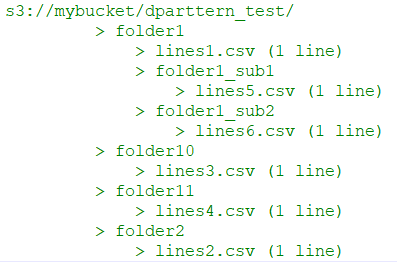LOAD DATA (Files Load)
The LOAD DATA command allows you to write raw data into Indexima tables.
Syntax
Load Data from local disk
LOAD DATA [LOCAL]
INPATH '<protocol>://<absolute_path_to_data>'
INTO TABLE <table_name>
FORMAT CSV|ORC|PARQUET|JSON
SEPARATOR ',|;|\t'
[SKIP <number_of_row_to_skip> ]
[LIMIT <limit_number>]
[PATTERN <file_pattern>]
[DPATTERN <folder_pattern>]
[PREFIX <prefix>]
[SUFFIX <suffix>]
[DATE_FORMAT <date_format>]
[TIMESTAMP_FORMAT <timestamp_format>]
[LOCALE <locale_identifier>]
[NOCHECK]Parameters
| Parameter name | Description | Possible values |
|---|---|---|
LOCAL | If used, this keyword tells the Master node to read data from his own filesystem. | Empty | LOCAL |
protocol | The type of datalake you want to load data from. | s3 | adl | gs | hdfs |
| absolute_path_to_data | The absolute path to a folder containing all the files you want to load data from. If LOCAL is specified, only the Master node needs to have read access to this path. | Any absolute path is readable by the Indexima nodes. |
| table_name | The name of the Indexima table you want to load the data into. | The exact name of the Indexima table you want to load data into. The structure of the files must match the structure of the table. |
| number_of_row_to_skip | The number of rows to skip before starting the load. This is used to skip the first or the 2 first rows, which are usually header rows. | Any positive number. |
| limit_number | Maximum Number of rows that will be read from each file. | Any positive number. |
| file_pattern | Only files beginning with the defined pattern would be loaded. Must end with a star. | |
| folder_pattern | load all files contained in <absolute_path_to_data>: Use "*" (star) as the wilcard and "/" for subfolder
| |
| prefix | see below in "Load partitions from Hive table". | |
| Suffix | supports only CSV format, same concept as prefix applied for missing column at the end of each line. | |
| DATE_FORMAT | Specify a format to parse the dates in input file. | |
| TIMESTAMP_FORMAT | Specify a format to parse the timestamps in input file. Eg: TIMESTAMP_FORMAT 'dd/MM/yyyy HH|mm|ss' The pattern must comply to Java DateTimeFormatter (https://docs.oracle.com/javase/8/docs/api/java/time/format/DateTimeFormatter.html) | |
| LOCALE | The local identifier used to parse the input file. This identifier describe the expected format for decimal fields. Eg: LOCALE 'fr' | |
| NoCheck | Without this option, INDEXIMA checks if loaded values are compatible with the datatype set when creating the table. INDEXIMA triggers errors when datatypes do not match. |
Load Example
LOAD DATA
INPATH 'mypath'
INTO TABLE myschema.mytable
FORMAT CSV
SEPARATOR ','
SKIP 1
LIMIT 10
PATTERN 'Mypattern*'
PREFIX 'myprefix'
DATE_FORMAT 'dd_MM_yyyy'
TIMESTAMP_FORMAT 'dd/MM/yyyy HH|mm|ss'
NOCHECKLoad with comma as decimal separator in input file
lang-en.csv
1;10.05;hello
lang-fr.csv
2;12,98;salut
Commands
CREATE SCHEMA tmp;
CREATE TABLE tmp.t1(i int, d double, s string, main index idx_0(i));
LOAD DATA IN PATH '/home/csv/lang-en.csv' into table tmp.t1 format CSV SEPARATOR ';' LOCALE 'en';
LOAD DATA IN PATH '/home/csv/lang-fr.csv' into table tmp.t1 format CSV SEPARATOR ';' LOCALE 'fr';
COMMIT tmp.t1;
SELECT * FROM tmp.t1;
Result
d s
10.05 hello
12.98 salut
Load partitions from Hive table
If you want to load a specified set of partitions and not all partitions from a Hive table at once, then provide a path of the root partition and add PREFIX 'column_values' to specify the values for the partition columns.
LOAD DATA INPATH 'hdfs://data_node:8020/apps/hive/warehouse/my_imported_data_orc/year=2018/month=12/day=10'
INTO TABLE my_test
FORMAT orc
PREFIX '2018,12,10,'If the Hive table is in tab-separated format, the separator must be \t so the statement looks like PREFIX '2018\t12\t10\t'.
Load Example with a suffix
Add SUFFIX 'column_values' to specify the values that will finish the CSV line when there is fewer columns than expected (defined by the list of columns in the table creation).
LOAD DATA INPATH 'hdfs://data_node:8020/apps/hive/warehouse/myORCtable'
INTO TABLE my_test
FORMAT CSV
SUFFIX 'XX,YY'Load Example with DPATTERN
Consider the following tree view

Here is a list of examples with the expected behavior.
-- All files within s3a://mybucket/dparttern_test/ --> Insert 6 lines
LOAD DATA INPATH 's3a://mybucket/dparttern_test/' INTO TABLE tmp_sco.tbl1 FORMAT CSV SEPARATOR ',' DPATTERN '**';
--All files within any subfolders with a name beginning with folder1_sub --> Insert 2 lines
LOAD DATA INPATH 's3a://mybucket/dparttern_test/' INTO TABLE tmp_sco.tbl1 FORMAT CSV SEPARATOR ',' DPATTERN '**/folder1_sub*';
--All files within the any subfolders with a name beginning with folder1_sub AND files names beginning with lines --> Insert 2 lines
LOAD DATA INPATH 's3a://mybucket/dparttern_test/' INTO TABLE tmp_sco.tbl1 FORMAT CSV SEPARATOR ',' DPATTERN '**/folder1_sub*' PATTERN 'lines*';
--All files within any folders with THE name folder1 AND files names beginning with lines --> Insert 3 lines
LOAD DATA INPATH 's3a://mybucket/dparttern_test/' INTO TABLE tmp_sco.tbl1 FORMAT CSV SEPARATOR ',' DPATTERN 'folder1/**' PATTERN 'lines*';
--All files within any folders with a name beginning with folder1 AND files names beginning with lines --> Insert 5 lines
LOAD DATA INPATH 's3a://mybucket/dparttern_test/' INTO TABLE tmp_sco.tbl1 FORMAT CSV SEPARATOR ',' DPATTERN 'folder1*/**' PATTERN 'lines*';
--All files within any subfolders with a name containing with 'sub' --> Insert 2 lines
LOAD DATA INPATH 's3a://mybucket/dparttern_test/' INTO TABLE tmp_sco.tbl1 FORMAT CSV SEPARATOR ',' DPATTERN '**/*sub*';